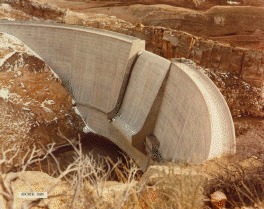Anchor Dam facts for kids
Quick facts for kids Anchor Dam |
|
|---|---|

Anchor Dam
|
|
| Country | United States |
| Location | Hot Springs County, Wyoming |
| Purpose | Irrigation |
| Status | Operational, but not as designed |
| Operator(s) | Owl Creek Irrigation District |
| Dam and spillways | |
| Type of dam | Arch dam |
| Impounds | South Fork of Owl Creek |
| Height (foundation) | 208 feet (63 m) |
| Reservoir | |
| Creates | Anchor Reservoir |
| Total capacity | 17,400 acre-feet (21,500,000 m3) (designed) |
Anchor Dam is a special dam located in Hot Springs County, Wyoming, in the United States. It's about 35 miles west of a town called Thermopolis, Wyoming. This dam was built to store water, but it has a very interesting story because its reservoir never filled up completely.
Contents
Anchor Dam: A Unique Story
What is Anchor Dam?
Anchor Dam is a type of dam called a concrete thin-arch dam. It was finished in 1960 by the United States Bureau of Reclamation. This agency helps manage water resources in the U.S. The dam is 208 feet tall, which is about as high as a 20-story building! It holds back the water from the South Fork of Owl Creek. The dam was designed with a special "notch" in the middle to let extra water flow over, like a waterfall.
Why Didn't the Reservoir Fill?
The most unusual thing about Anchor Dam is that its reservoir, called Anchor Reservoir, never filled up as planned. It was designed to hold 17,400 acre-feet of water. An acre-foot is the amount of water needed to cover one acre of land with water one foot deep.
The problem was discovered during construction. The ground underneath the dam had many natural holes and cracks. These are called solution cavities and are common in areas with karst geology. Karst is a type of landscape where soft rocks like limestone have been dissolved by water, creating caves and sinkholes.
More than 50 sinkholes were found in the ground where the reservoir was supposed to be. Some of these sinkholes were very large, like one that was 30 feet wide and 35 feet deep! These holes meant that water would leak out of the reservoir instead of staying in. Even though scientists knew about these issues, the dam was still built.
How is it Used Today?
Even though Anchor Reservoir never reaches its full size, it still helps local farmers. It collects enough water to provide some irrigation for crops during July and August each year. The dam is managed by the Owl Creek Irrigation District, which helps deliver water to farms in the area.
 | Georgia Louise Harris Brown |
 | Julian Abele |
 | Norma Merrick Sklarek |
 | William Sidney Pittman |

